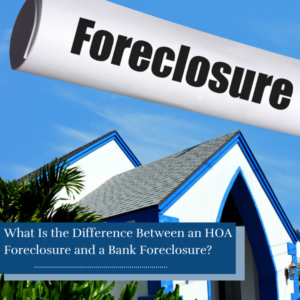What Is the Difference Between an HOA Foreclosure and a Bank Foreclosure?

When buying a home in a planned neighborhood or a condominium, you often must pay fees and assessments to a Homeowner’s Association (HOA) or Condominium Owner’s Association (COA). If you do not, the HOA or COA can place a lien on your home and force you to foreclose, similarly to when a bank forces you to foreclose if you do not keep up with your mortgage payments. This post briefly covers some basic differences between these two scenarios.
Differences in the Foreclosure Process: Judicial vs. Non-Judicial
A foreclosure is a process whereby a property owner can lose their ownership interest in the real estate to pay money they owe, normally when they fail to keep up with payments on a debt secured by the underlying property. For example, you a foreclosure can be commenced if you fail to keep up with mortgage payments.
There are two broad categories of foreclosures in North Carolina: judicial and non-judicial. In a judicial foreclosure, someone you owe money to can request that a court allow them to force the sale of property to recover the unpaid debt. If you respond to their lawsuit, you and the party seeking to collect can argue your sides before a court, which will then issue a ruling on the case. If you do not respond to the lawsuit, the plaintiff can potentially move for a default judgment against you and proceed with the sale.
By contrast, most HOA/COA foreclosures in North Carolina are non-judicial. In a non-judicial foreclosure, a preliminary hearing takes place to determine whether the foreclosure should proceed. The clerk of the county court with jurisdiction over the property in question presides over the hearing. The property owner must receive notice of the hearing ahead of time. The court clerk then weighs the evidence at the hearing and decides whether the foreclosure sale should proceed.
Foreclosure Timeline and Notice Requirements
An HOA/COA cannot place a lien on your property unless an assessment or fee is at least 30 days overdue. Further, it must remain so for 90 days before a foreclosure can proceed, which also requires approval from the executive board of the association. Finally, the HOA/COA must notify you of its intent to file a lien at least 15 days before doing so. All of these procedural timing requirements protect property owners by giving them enough time to respond and make things right if possible.
Impact of a Foreclosure on Your Ability to Borrow Money in the Future
Foreclosures, including those initiated by an HOA or COA, can lower your credit score and negatively impact your ability to obtain loans in the future. If you owe fees to your HOA/COA, your credit score may not be impacted at all. This depends largely on whether your association regularly reports late payments to the national credit bureaus.
However, if the association successfully forecloses on your home, the impact on your credit score is highe. According to FICO, the degree of impact depends largely on your initial credit score. A high credit score is more likely to drop significantly after a foreclosure. By contrast, if your credit score is already low, it will most likely drop less.
Our Experienced Attorneys Can Help
If you are facing an HOA/COA foreclosure, the best thing to do is consult with an experienced foreclosure attorney to make sure you understand your rights. A chapter 13 bankruptcy can stop an HOA foreclosure. If you wait too long, you could end up losing your home and damaging your long-term financial health. The legal team at the Sasser Law Firm has the experience needed to ensure the best outcome in your case. Call us today at (919) 319-6400 or visit us online to schedule a free consultation with a bankruptcy attorney in Cary, North Carolina.
- About the Author
- Latest Posts
For more than 20 years, the Sasser Law Firm has been helping individuals and business owners sort through financial hardships to see the light at the end of the tunnel. Our North Carolina bankruptcy attorneys are all board-certified specialists, which means we have passed a complex exam, undergone a thorough peer review, and continue to earn legal education credits in this ever-evolving area of law.














